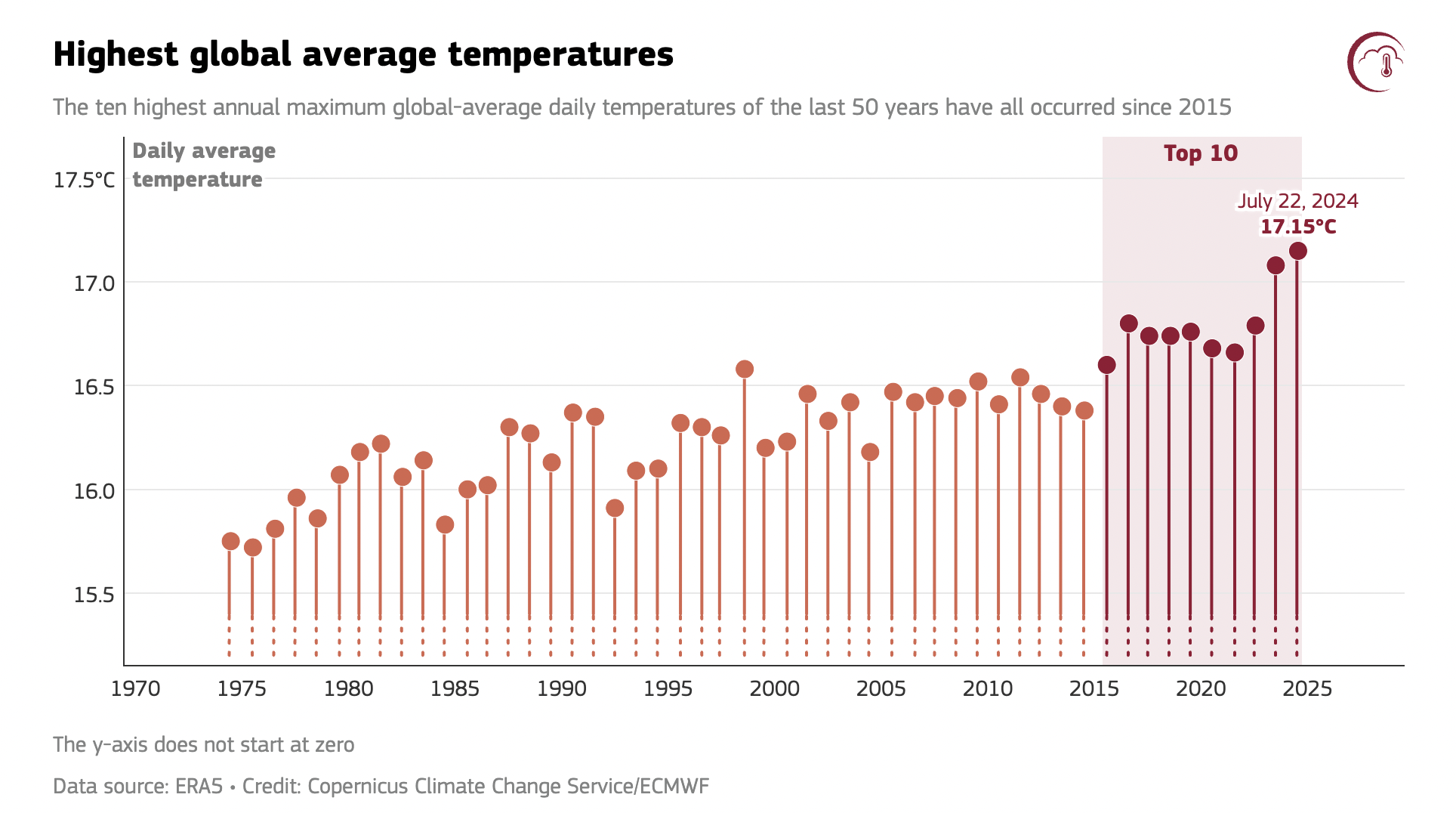In a world of hyperbolic communication, Monday warranted the drama.
“Hottest day ever,” headlines screamed, as the planet clocked a daily global average of 17.15°C, according to Copernicus Climate Change Service (C3S), a European Union climate agency, which is the highest temperature ever recorded.
Monday’s temperature eclipsed a record set just 24 hours earlier, when the daily global average temperature was 17.09°C, a hair above the record of 17.08°C set in July 2023. The pace of change was underscored by the flurry of activity at C3S, which amended its press release to reflect the new data. It has been tracking the daily global mean temperature since 1940.
“We are now in truly uncharted territory and as the climate keeps warming, we are bound to see new records being broken in future months and years,” Carlo Buontempo, director of C3S, said in a statement issued after the Sunday record. A day later he said, “We have a new record,” noting that the climate event “is still ongoing” and the peak may still change, with indicators suggesting the temperature may dip in the next few days.
A report published in June by a group of international researchers highlighted the “unprecedented” rate of human-induced planetary warming that continues to wreak havoc across the globe. Despite increasingly dire warnings, emissions of greenhouse gases remained persistently high in 2023. The researchers found that “unprecedented flows of heat” are sinking into the Earth’s oceans and that global average surface temperatures continue to rise. Record temperatures last year were “dominated by human activity,” but researchers found that natural climate variability, such as El Niño and La Niña, are also playing a part.
“Our analysis suggests that the sudden rise in daily global average temperature is related to much-above-average temperatures over large parts of Antarctica. Such large anomalies are not unusual during the Antarctic winter months, and also contributed to the record global temperatures in early July 2023,” the European agency said. In addition, Antarctic sea ice is almost as low as it was at this time last year, contributing to higher temperatures over parts of the Southern Ocean.
Heat is a defining calamity of the climate crisis. True to the form of recent years, heat waves have gripped parts of Europe this month, triggering a battery of extreme heat alerts, creating ghost towns out of popular tourist destinations and driving up urgent calls for water bombers to fight forest fires in Italy and Macedonia. Greece temporarily shut down the Acropolis amid scorching temperatures earlier in July, while some municipalities banned outdoor work, and the zoo in Rome drew up plans to give its animals popsicles.
Related:
- Six ways cities are tackling heat waves with cooling solutions
- Buckling under deadly heatwaves, workers are going on strike in protest
- Can a wave of chief heat officers help cool a melting planet?
North America also saw records smashed, with parts of the United States blanketed by a heat dome in June and extreme temperatures stretching into July. In Canada, wildfires in Alberta’s Jasper National Park sent thousands of evacuees over the border into British Columbia this week, seeking refuge. Help centres were set up, and locals opened up their homes, but B.C. government officials warned that the province, which is battling its own blazes, didn’t have the capacity to accommodate the droves of people and was arranging shuttles to take them back this week.
Some 25,000 people were evacuated from Jasper. B.C. Wildfire service said the region had been hit by 58,000 lightning strikes in the last week, sparking blazes under the dry conditions created by a three-week heat wave.
Extreme weather also poses an increasing risk to the industries that are fuelling it, as evidenced by the evacuation of Alberta oil sands workers from plants that were threatened by forest fires. Last year, Suncor Energy noted in company filings that a 10-day shutdown of its Base Plant oil sands mine in Alberta would cost it $56 million a day.
Canada is warming faster than anywhere on Earth – twice as fast as the global average, with its arctic regions warming four times faster. The global toll on health is well documented: a study published in showed that between 1981 and 2018, 37% of heat-related deaths globally could be attributed to climate change. India has endured a brutal summer this year, with temperatures of almost 50°C in May and June which killed more than 70 people.
Stela Herschmann, a climate-policy specialist at Brazil’s Observatorio do Clima, says the heat records are proof that “the worst predictions of the scientists are becoming true.”
“What this record shows us is how hard the task ahead of us is, and how urgent,” she says. “We spent the last couple of centuries dumping on the atmosphere all these greenhouse gases, and they will not be gone by pushing a button.”
That’s why, she says, it’s important for people to take stock of the changes. “It should give us the sense of urgency to move and decarbonize deeply as fast as we can, so we can try to live in a little bit better conditions.”








